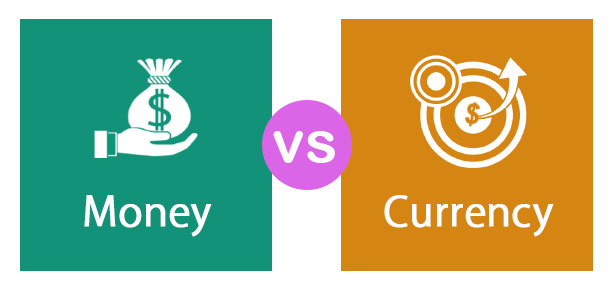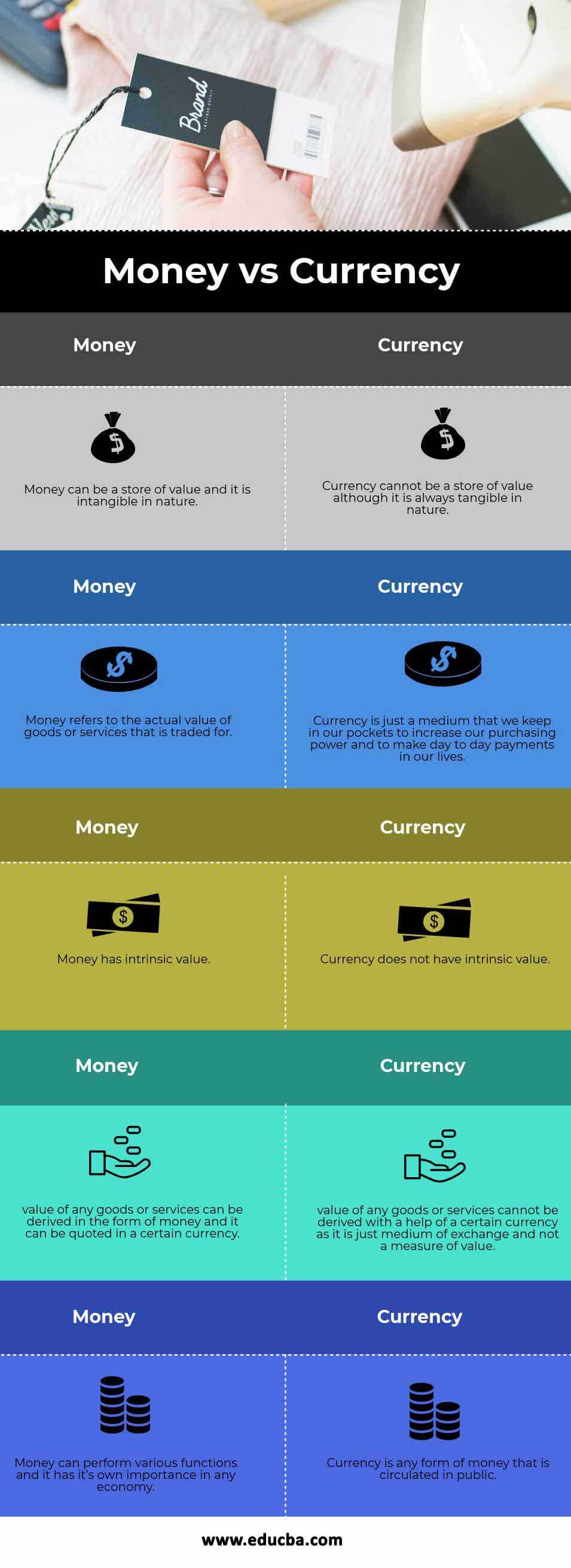Updated July 31, 2023

Difference Between Money vs Currency
Money and Currency are often used interchangeably in the general world however when they are looked at in the light of economic functions these two have two very different meanings and interpretations. To layman money and currency are one and the same thing. But has different economic implications. In this Money vs Currency article, we will try and understand the key differences between money vs currency and how both they are different from each other.
Head To Head Comparison Between Money vs Currency (Infographics)
Below is the top 5 difference between Money vs Currency:

Key Differences Between Money vs Currency
Let us discuss some of the major differences between Money vs Currency:
- Money is intangible in nature which means that it cannot be felt or touched, and it cannot be smelled however in terms of numbers the importance of money is paramount and impeccable. It is a store of value and the value increase as the money amount increases. On the other hand, Currency is a tangible concept as it can be felt, touched, and has physical value, the currency is a medium of exchange and it is not a store of value. Currency is mostly used in international transactions and trade between the two countries.
- A promissory note or a coin given in the form of currency is referred to as currency. Currency is a medium through which money becomes live. Money is often categorized under good money and bad money, good money is considered to be gold, and bad money is considered to be a currency.
- The value of a certain currency, when compared to international currencies which are normally known as the exchange rate, tells us about the foreign policies and how to sound it the monetary policy of the country. On the other hand, the Money supply in a particular country tells us about the economic and fiscal policies of the country and can also be looked at as an economic indicator
- Currency is often referred to as a legal tender as it is approved by the government and can be used domestically anywhere as a method of payment to be used and the government will accept it in the payment of the taxes. Money, on the other hand, is subjective in nature and can be or cannot be accepted anywhere and everywhere as a medium of exchange or a store of value
- A currency has to be derived from the Latin word “currere” which means “to run” or “to flow”. On the contrary, Money has been derived from the Roman word “monere” which means “to warn” in Latin.
Money vs Currency Comparison Table
Let’s look at the top 5 Comparison between Money vs Currency
| Money | Currency |
| Money can be a store of value and it is intangible in nature | Currency cannot be a store of value although it is always tangible in nature |
| Money refers to the actual value of goods or services that are traded for | Currency is just a medium that we keep in our pockets to increase our purchasing power and to make day to day payments in our lives |
| Money has intrinsic value | Currency does not have intrinsic value |
| The value of any goods or services can be derived in the form of money and it can be quoted in a certain currency | The value of any goods or services cannot be derived with the help of a certain currency as it is just a medium of exchange and not a measure of value |
| Money can perform various functions and it has its own importance in any economy | Currency is any form of money that is circulated in public |
Conclusion
Money vs Currency are often used interchangeably and it is very difficult to draw a thin line of difference between the two. Money has certain features like it should be divisible, durable, portable which currently does not have. Currency is simply a form of paper that numbers it. Currency, however, can perform the above function but it cannot perform the one important function that money does that is currency cannot act as a store of value.
Recommended Articles
This has been a guide to the top difference between Money vs Currency. Here we also discuss the Money vs Currency key differences with infographics and a comparison table. You may also have a look at the following articles to learn more –



